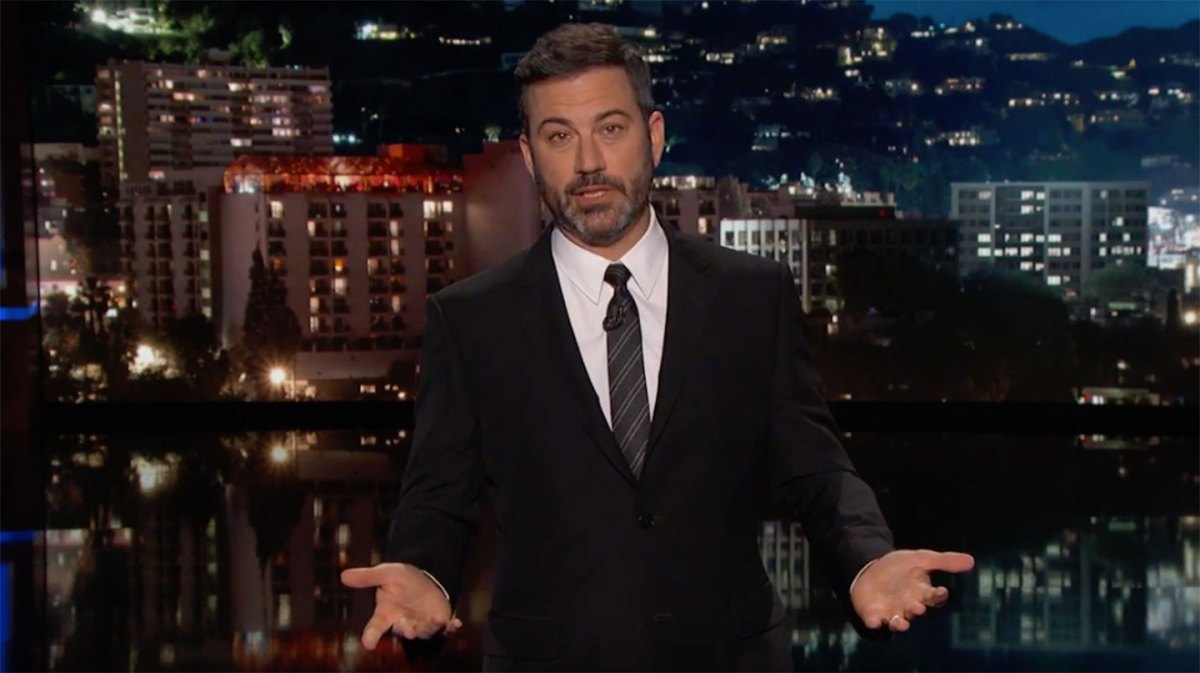Once just another funny voice in the late-night talk show circus, Jimmy Kimmel has separated himself from his peers by somewhat paradoxically shedding his act in favor of a “real persona.”
That is, one that talks about trending news issues without the comedic turn of phrase of a Seth Meyers or tone-deaf hair-ruffling of a Jimmy Fallon.
What you see is what you get, as is evidenced first by Kimmel’s heartfelt monologue about his son’s fight for his young life—and then his wading into the healthcare debate and slamming Republicans trying to repeal Obamacare. He even went as far to call out one politician for lying to his face. Then he weighed in on the Vegas shooting (see above). As Vulture‘s David Marchese argues, “It was a moment that recalled Walter Cronkite speaking out against the Vietnam War.”
Vulture recently caught up with Kimmel about his new role as America’s politically charged late-night voice of reason. RealClearLife has teased out some of the best bits from the interview below.
-On his new highly political angle: “[I] think that as a talk-show host, you get a lot of reaction if you talk about something seriously,” Kimmel told Vulture. “It’s almost the same thing as your ne’er-do-well cousin giving a nice speech at a funeral. He probably gets a little more credit than he deserves.”
-On what he thinks of his previous shows like The Man Show: “I look back at every show I’ve ever done and cringe. My vision of hell is a bunch of monitors with my old shows running on them.”
-Kimmel tells Vulture that he didn’t ask ABC executives’ permission to talk about healthcare on his show. In fact, the only person he discussed it with was his wife, who is a head writer on the show. “Your boss doesn’t want you to ask about doing anything like that,” Kimmel says. “They don’t want to be complicit. They’d rather you do it without their knowledge.”
-On whether Kimmel’s had a “political awakening” or not: “There’s definitely been a shift in my feeling about the country over the last year or so,” he says. “I feel frustrated. …I go to bed worried and I wake up worried, and I honestly don’t know if things are going to be okay. I worry that we’re going to look back at Donald Trump almost fondly because someone worse will come after him.”
-Kimmel says the closest thing he can compare to Trump getting elected president is hearing that O.J. Simpson had been acquitted.
-The comedian says he takes no credit for the healthcare repeal being struck down. “For me to say that I had an effect on that health-care vote would diminish what Susan Collins and John McCain and Lisa Murkowski and, for all the wrong reasons, Rand Paul did. Those were their decisions to make—courageous decisions as members of the Republican Party.”
-Since then, Kimmel has taken up the banner of gun control (Las Vegas massacre) and healthcare (the Obamacare repeal fight). And he’s apparently been approached to talk about other trending issues on the air. “I’m overwhelmed with requests to speak or be honored,” he says. “It’s always weird to say, ‘No thank you, I don’t want to be honored.’”
-On the top of “Trump [joke] fatigue”: “I worry about my own fatigue because the audience can always tell if the host isn’t interested. So I worry about it, but there’s nothing you can do about it. We don’t know what’s going to happen in the world, and on the show there’s never a long-term plan. Everything just keeps going.”
This article appeared in an InsideHook newsletter. Sign up for free to get more on travel, wellness, style, drinking, and culture.
























